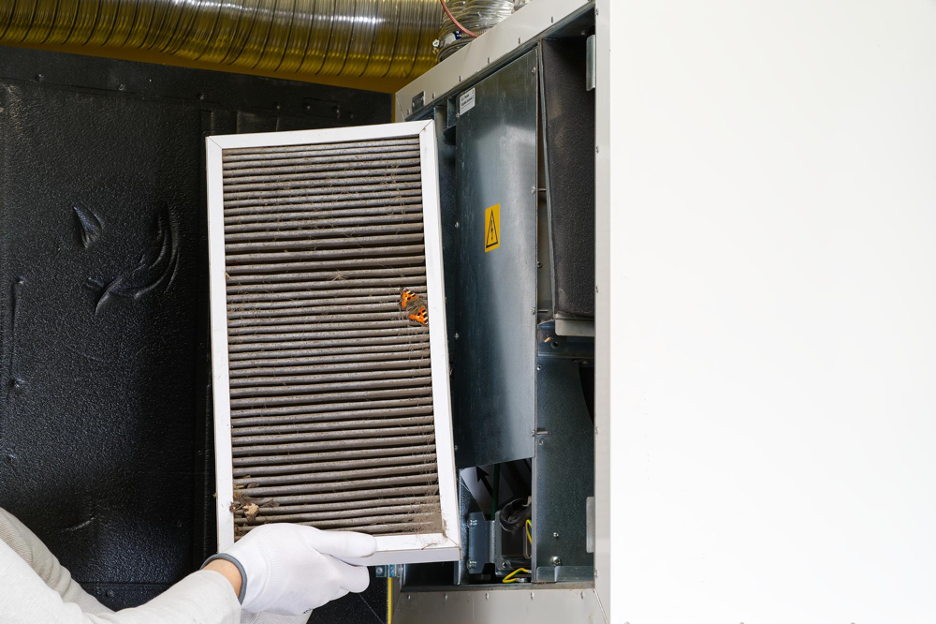January 5, 2024
Replacing Your Air Filters & Why It’s Important

Did you know, that studies show 29% of Americans never change their air filter in their home? The alarming fact is, that few people ever think about their air filters – until something goes wrong. But, your air filter is quite possibly one of the most vital pieces of infrastructure in your entire home! Ideally, air filters should be replaced at least once a year. A dirty air filter can have negative effects on your home in much the same way as a blocked duct. They can leave your home feeling chilly, uncomfortable, and filled with allergens that could be bad for your health! There are many benefits to regularly inspecting and replacing your air filters.
Homeowners who take the time to inspect and replace their air filters often experience a noticeable improvement in the air quality within their homes. The primary function of an air filter in the HVAC system is to purify the air, eliminating outdoor pollutants, pollen, excess animal fur, mold, allergens, and even bacteria and viruses. The NIH states “Air filters reduced indoor fine particle concentrations by 60% (India, 2016).” These filters act as guardians, trapping these airborne irritants and preventing them from circulating further in your home. However, when an air filter reaches its capacity, it not only loses its ability to capture more contaminants but can also impede the airflow.
Improve Air Quality
The consequences of an overfull air filter can manifest in unpleasant odors, respiratory issues, and an overall feeling of “mustiness” throughout the home. Fortunately, changing the air filters provides an instant remedy to these problems. By doing so, you and your loved ones can once again enjoy a home environment with fresher, cleaner air, promoting better respiratory health and a more pleasant living space.
Improved Efficiency
When an air filter becomes clogged, its impact on HVAC efficiency is akin to a physical obstruction within the air ducts. This obstruction forces the entire system to work harder to push air through, leading to a significant reduction in efficiency. The consequences of this reduced efficiency are twofold: increased energy costs and added strain on the heating or cooling element within the system. Not only does the system require more electricity to force air through the obstructed filter, but the overall operation becomes less cost-effective, contributing to higher energy bills for homeowners.
Fewer Repairs
Repairing an HVAC unit can be very expensive, especially if the system hasn’t been well-maintained. In some cases, extensive repairs may even necessitate a full system replacement. However, implementing simple and regular maintenance practices, such as consistently replacing your air filters, can act as a preventive measure against potential damage caused by an overworked system. By addressing common issues like reduced air flow or difficulty maintaining consistent temperatures through regular air filter replacements, you can save yourself from the headache and expense of major HVAC Repairs.
How Often Should You Change Your Filter?
Addressing the question of how frequently you should change your air filter is not as straightforward as it may seem. Several factors come into play when determining the ideal interval for this essential task:
- Home Fragrance and Incense Usage:
- Do you regularly burn candles or indulge in the aromatic allure of incense within your living space?
- Cooking Methods:
- Consider your cooking habits. The way you prepare your meals can impact the lifespan of your air filter.
- Furry Friends at Home:
- Do you share your space with pets that generously contribute to shedding their fur?
- Seasonal Considerations:
- The time of year can influence how often your air filter requires attention.
While there isn’t a one-size-fits-all answer, a general recommendation falls within the range of changing your air filter every month to every 90 days. To navigate this, it’s advisable to inspect your air filter on a monthly basis. This proactive approach allows you to assess its condition and determine whether it’s time to make a change. By staying attuned to these factors, you can ensure that your indoor air quality remains at its best, promoting a healthier and more comfortable living environment.
Extends the Life of Your Unit
Consistent air filter replacements not only prevent major repairs but also contribute to extending the life of your HVAC unit. This regular maintenance practice ensures your system is never overworked, increasing the likelihood of enjoying your unit for its entire manufacturer-stated lifespan.
Are you looking to enhance the air quality in your home? Bowman Heating and Cooling’s Air Quality Assessment is the solution. This thorough evaluation, conducted by qualified professionals with expertise in indoor air quality testing and analysis, provides comprehensive insights into your building’s indoor air quality. At Bowman Heating and Cooling, we specialize in HVAC units, and we’re dedicated to addressing all your HVAC-related concerns. Contact us today for a free consultation!

